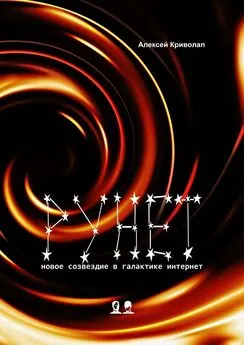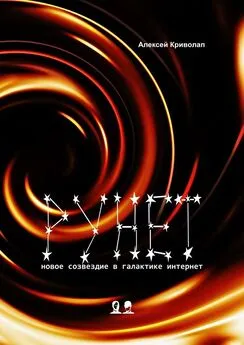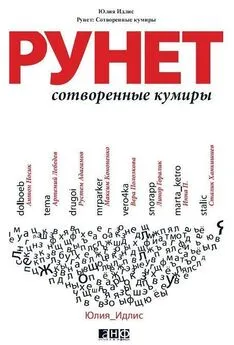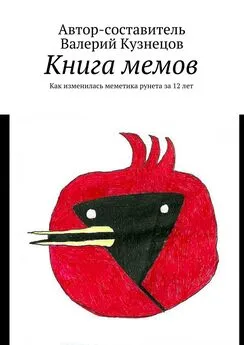Алексей Криволап - Рунет
- Название:Рунет
- Автор:
- Жанр:
- Издательство:неизвестно
- Год:2017
- ISBN:нет данных
- Рейтинг:
- Избранное:Добавить в избранное
-
Отзывы:
-
Ваша оценка:
Алексей Криволап - Рунет краткое содержание
Рунет - читать онлайн бесплатно ознакомительный отрывок
Интервал:
Закладка:
Goldsmith, Jack L. Who controls the Internet?: illusions of a borderless world . New York: Oxford University Press, 2006.
Gornyĭ, Evgeniĭ. A Creative History of the Russian Internet: Studies in Internet Creativity . Saarbrücken: VDM Verlag Dr. Müller, 2009.
Halavais, Alexander M. Campbell. Search Engine Society . Digital media and society series. Cambridge; Malden, MA: Polity, 2009.
Hardt, Michael. Empire . Cambridge, Mass: Harvard University Press, 2000.
Hine, Christine. Virtual ethnography . London; Thousand Oaks, Calif: SAGE, 2000.
— — —. «Virtual Methods and the Sociology of Cyber-Social-Scientific Knowledge». В Virtual methods: issues in social research on the Internet , 1—13. Oxford; New York: Berg, 2005.
Hoggart, Richard. An English temper: essays on education, culture, and communications . London: Chatto & Windus, 1982.
Holt, Richard. Dialogue on the Internet: language, civic identity, and computer-mediated communication . Civic discourse for the third millennium. Westport, Conn: Praeger, 2004.
«Internet Time Swatch. beat», 23 октябрь 1998 г. http://www.swatch.com/zz_en/internettime/itime_howitworks.html.
Jack Linchuan Qiu, и Hargittai Eszter. «China Internet Studies: A Review of the Field». В Academy and the Internet , 275—307. Peter Lang, 2004.
Katz, James Everett. Social consequences of Internet use: access, involvement, and interaction . Cambridge, Mass: MIT Press, 2002.
Kelle, Udo. «Theory Building in Qualitative Research and Computer Programs for the Management of Textual Data». Sociological Research Online 2, вып. 2 (30 июнь 1997 г.). http://www.socresonline.org.uk/2/2/1.html.
Lévy, Pierre. Cyberculture . Electronic mediations, v. 4. Minneapolis: University of Minnesota Press, 2001.
Lightman, Alex. Brave new unwired world: the digital big bang and the infinite Internet . New York: J. Wiley & Sons, 2002.
Ludlow, Peter. Crypto Anarchy, Cyberstates, and Pirate Utopias . Cambridge, Mass.: MIT Press, 2001.
Luhmann, Niklas. Die Realität der Massenmedien . Wiesbaden: VS, Verl. für Sozialwissenschaften, 2004.
Mann, Chris. Internet communication and qualitative research: a handbook for researching online . New technologies for social research. London; Thousand Oaks, Calif: Sage Publications, 2000.
Manovich, Lev. The Language of New Media . Cambridge, Mass.: MIT Press, 2002.
Mapping ideology . Verso, 2012.
Morozov, Evgeny. «How Dictators Watch Us on the Web». Prospect , 18 ноябрь 2009 г. http://www.prospectmagazine.co.uk/magazine/how-dictators-watch-us-on-the-web.
— — —. The net delusion: the dark side of internet freedom . 1st ed. New York: Public Affairs, 2011.
— — —. To save everything, click here: the folly of technological solutionism . First edition. New York: PublicAffairs, 2013.
http://nethistory.server.md/NetHistory.ldova», б. д. «NetHistory.Mo
Papacharissi, Zizi. A private sphere: democracy in a digital age . Digital media and society. Cambridge, UK; Malden, MA: Polity, 2010.
Pariser, Eli. The Filter Bubble: How the New Personalized Web Is Changing What We Read and How We Think . New York, N.Y.: Penguin Books/Penguin Press, 2012.
Paulsen, Martin. «ByNet — Just Another National Internet?», 16. Passau, Altstadthotel: University of Bergen, 2011.
Poster, Mark. Information please: culture and politics in the age of digital machines . Durham: Duke University Press, 2006.
r00t. «Хар-ки байнета», 2 февраль 2006 г. http://forum.onliner.by/viewtopic.php?p=2834486#p2834486.
Radical democracy and the Internet: interrogating theory and practice . Basingstoke, Hampshire; New York: Palgrave Macmillan, 2007.
Rafal Rohozinski. «Mapping Russian Cyberspace: Perspectives on Democracy and the Net». UNRISD Discussion Paper. United Nations Research Institute For Social Development, октябрь 1999 г.
Ritzer, George. The Mcdonaldization of society . New Century ed. Thousand Oaks, Calif: Pine Forge Press, 2000. http://www.mcdonaldization.com.
Routledge handbook of Internet politics . Routledge international handbooks. London; New York: Routledge, 2009.
Saco, Diana. Cybering democracy: public space and the Internet . Electronic mediations, v. 7. Minneapolis: University of Minnesota Press, 2002.
Sarazac, Tom. «Swatch „Internet Time“ — Scam or Stupidity?», 25 октябрь 1999 г. http://www.tomsarazac.com/tom/opinions/swatch.html.
«SATIO: Интернетом в Беларуси пользуется 32% взрослого населения», 22 декабрь 2006 г. http://www.tutby.com/publications/analysis/3907/.
Schmidt, Henrike, Katy Teubener, и Natalja Konradova. Control + Shift: Public and Private Usages of the Russian Internet . Norderstedt: Books on Demand GmbH, 2006.
Shapiro, Andrew L. The control revolution: how the Internet is putting individuals in charge and changing the world we know . 1st ed. New York: PublicAffairs, 1999.
Shenk, David. The end of patience: cautionary notes on the information revolution . Bloomington: Indiana University Press, 1999.
Simon, Leslie David. Democracy and the Internet: allies or adversaries? Wilson forum. Washington, D.C.: Baltimore Md: Woodrow Wilson Center Press; Distributed by The Johns Hopkins University Press, 2002.
Slevin, James. The internet and society . Malden, MA: Polity, 2000.
Stalder, Felix. Manuel Castells: the theory of the network society . Key contemporary thinkers. Cambridge, UK; Malden, MA: Polity, 2006.
Stuart Hall: critical dialogues in cultural studies . Comedia. London; New York: Routledge, 1996.
Tai, Zixue. The Internet in China: cyberspace and civil society . Routledge studies in new media and cyberculture. New York: Routledge, 2006.
The global transformations reader: an introduction to the globalization debate . 2nd ed. Cambridge, UK: Malden, MA USA: Polity Press; Distributed in the USA by Blackwell Pub, 2003.
The information society in Europe: work and life in an age of globalization . Critical media studies. Lanham, Md: Rowman & Littlefield Publishers, 2000.
The Internet in everyday life . Malden, MA, USA: Blackwell Pub, 2002.
The media reader: continuity and transformation . London; Thousand Oaks, Calif: Sage Publications, 1999.
«The networked empire: communicative capitalism and the hope for politics». В Empire’s new clothes: reading Hardt and Negri , 265—88. New York: Routledge, 2004.
Thurlow, Crispin. Computer mediated communication: social interaction and the Internet . Thousand Oaks, CA: Sage Publications, 2004.
Toffler, Alvin. The Third Wave . New York: Bantam Books, 1989.
Tomlinson, John. Globalization and culture . Chicago: University of Chicago Press, 1999.
Tranos, Emmanouil. The Geography of the Internet: Cities, Regions and Internet Infrastructure in Europe . Edward Elgar Publishing, 2013.
triogen. «Ответ зависит от языка», 25 июль 2005 г. http://pishu-pravilno.livejournal.com/1478295.html?thread=20573079#t20573079.
Turner, Graeme. «Television and Cultural Studies». International Journal of Cultural Studies 4, вып. 4 (2001 г.): 371—84.
Vitaliev, Dmitri. Digital Security and Privicy for Human Rights Defenders . FrontLine, 2007.
Walters, Gregory J. Human rights in an information age: a philosophical analysis . Toronto: University of Toronto Press, 2001.
Warf, Barney. Global Geographies of the Internet . 1-е изд. Dordrecht: Springer, 2012.
Weedon, Chris. Identity and Culture: Narratives of Difference and Belonging . Maidenhead: Open University Press, 2009.
What is cultural studies?: a reader . London; New York: New York, NY: Arnold; Distributed exclusively in the USA by St. Martin’s Press, 1996.
Williams, Raymond. Communications . 3rd ed. Pelican books. Harmondsworth; New York: Penguin, 1976.
— — —. Problems in materialism and culture: selected essays . London: Verso, 1980.
— — —. Television: technology and cultural form . 3d изд. Routledge classics. London; New York: Routledge, 2003.
Žižek, Slavoj. «Cultural Studies versus the „Third Culture“». The South Atlantic Quarterly 101, вып. 1 Winter (2002 г.): 19—32.
Приложения
Приложение 1. Список вопросов для полуструктурированного интервью
Ниже — пример анкеты для полуструктурированного интервью с белорусскими экспертами. При работе в Молдове или Украине упоминание о Беларуси и Белнете заменялись на молдавские и украинские примеры соответственно.
1. Внешнее влияние
1.1. Как вы оцениваете степень влияния иностранных (небелорусских) сайтов на развитие белорусского интернета?
1.2. В связи с вышеназванным влиянием или его отсутствием, нужно ли менять существующую ситуацию, если да, то что можно сделать?
1.3. Можно ли говорить о зависимости by-нета от ru-нета?
1.4. Если она есть, то в чем проявляется и как ее можно преодолеть?
2. Идентификация
2.1. Белорусские сайты часто сравнивают с российскими, насколько уместно подобное сравнение?
2.2. На основании каких критериев вы идентифицируете себя как белорусский интернет-проект?
2.3. Что такое by-нет для вас?
2.4. Можно ли считать by-нетом только белорусскоязычные сайты?
2.5. На ваш взгляд, есть ли шансы у by-нета стать белорусскоязычным?
3. Пространство
3.1. Есть ли границы в интернете?
3.2. Можно ли говорить о существовании общих постсоветских особенностей в развитии белорусского интернета?
3.3. На ваш взгляд, насколько успешно в Беларуси интернет встраивается в национальную медиасистему?
Приложение 2. Таблица кодов для работы с транскрибированными интервью
1. Идентификация
1.1. Идентичность Я — Мы
1.1.1. Критерии идентификации
1.1.2. Аудитория
1.1.3. Язык
1.1.4. «Свой путь» — особенности идентичности
1.1.5. Персонификация национального сегмента
1.2. Идентичность не-Я — не-Мы — Другой
Читать дальшеИнтервал:
Закладка:








